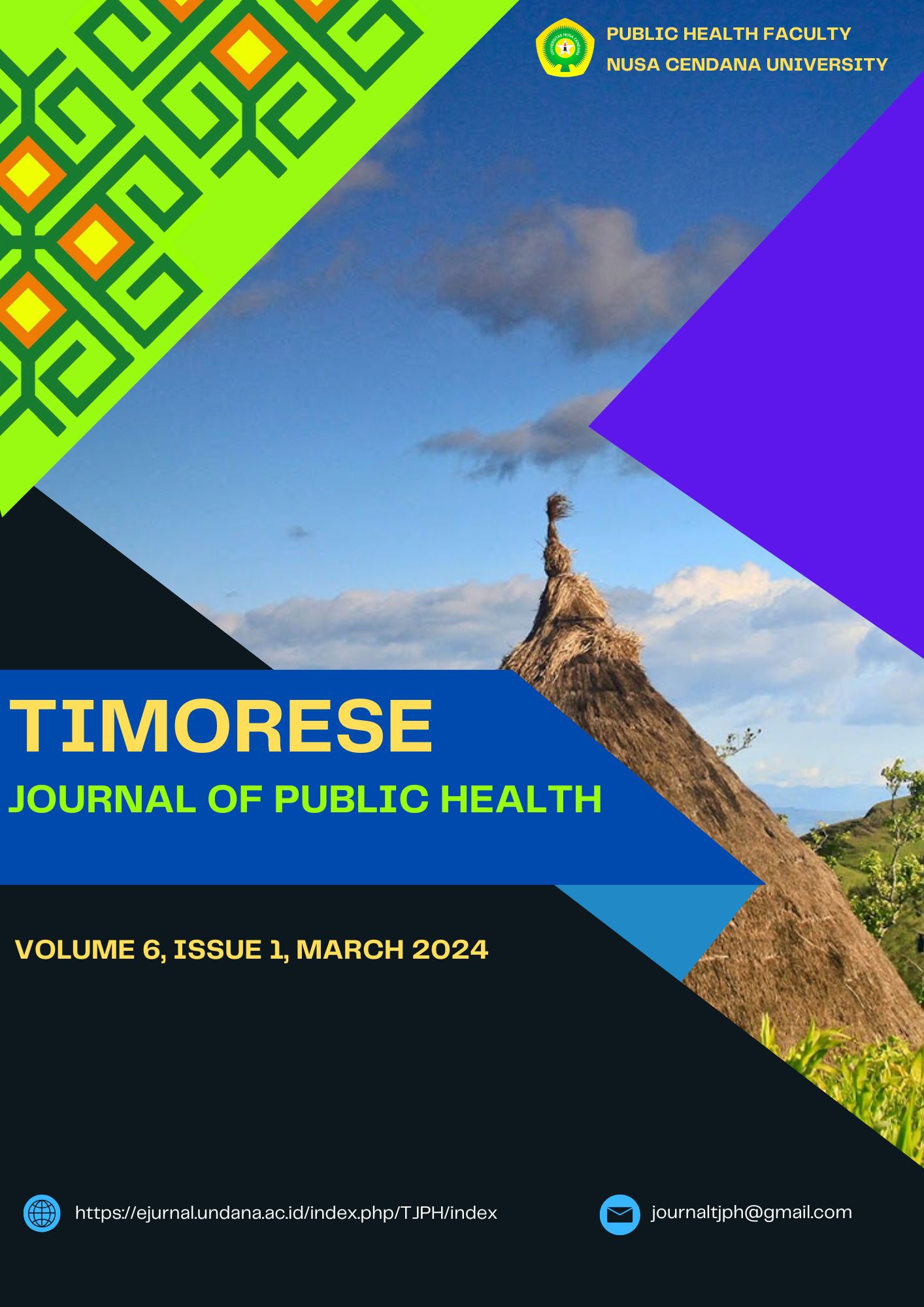Participation Of Men Of Childbearing Age In Vasectomy Contraception In Kupang Tengah Subdistrict In Kupang District
Main Article Content
Abstract
Vasectomy is a stable contraceptive technique for men by cutting the sperm ducts (vas deferens) that carry sperm out of the testicles. Central Kupang Regency is one of the districts with the lowest coverage of vasectomy contraception, namely there are only 10 male couples of childbearing age who use vasectomy contraception. This study aims to find out the reasons why men of reproductive age participate or not in the use of vasectomy contraception in Kupang Tengah District, Kupang Regency. This type of research was qualitative with the method of interviewing 10 informants consisting of 4 PUS who used vasectomy KB, 5 PUS who did not use vasectomy KB, and 1 PLKB support officer. Data analysis uses thematic analysis and triangulation. The results showed that husbands' knowledge of male contraception was categorized as lacking, because there were still many husbands who did not know about family planning contraception and the lack of sources of information about vasectomy contraception. Some of the respondents in this study had an attitude of not supporting their husbands in using the vasectomy family planning program, so they did not choose vasectomy contraception. In this study it can be seen that men who have had a vasectomy have a place to live far from the place of health services so it takes a long time. Under these circumstances, men still participate in vasectomy. It is suggested to PLKB officers that in counseling about vasectomy family planning not only among mothers, but also husbands so that husbands understand and understand about vasectomy contraception, so that later husbands have a sense of will and are no longer worried about vasectomy contraception.
Downloads
Article Details
References
2. Dinkes Provinsi NTT. Profil Kesehatan Provinsi Nusa Tenggara Timur. 2019;
3. Dinkes Kabupaten Kupang. Profil Kesehatan Kabupaten Kupang Tahun 2020. 2020.
4. Kementrian Kesehatan RI. Profil Kesehatan Indonesia 2019 [Internet]. Jakarta: Kemenkes RI; 2020. 1–497 p. Available from: https://pusdatin.kemkes.go.id/resources/download/pusdatin/profil-kesehatan-indonesia/Profil-Kesehatan-indonesia-2019.pdf
5. Kemenkes RI. Profil Kesehatan Indonesia Tahun 2019. Short Textbook of Preventive and Social Medicine. 2019. 28–28 p.
6. Mariari T. Dukungan Suami Dengan Pemilihan Pengunaan Kontrasepsi Intra Uterine Device (IUD). J Manaj Kesehat Yayasan RS Dr Soetomo. 2018;4(2):98–109.
7. BKKBN. Laporan Peserta KB Aktif Kabupaten Kupang Tahun 2020. Kabupaten Kupang: BKKBN.; 2020.
8. Notoatmodjo S. Ilmu Perilaku Kesehatan. Jakarta: Rineka Cipta; 2014.
9. Friedman. Keperawatan Keluarga Teori dan Praktik. Jakarta : ECG; 1998.
10. Fitriani E. Perilaku Akseptor Vasektomi dan Dukungan Keluarga Di Wilayah Kerja Kecamatan Panyabungan Kabupaten Mandaling Natal Tahun 2020. J Pilar Kebinanan Namira Madina. 2020;6(2).
11. Sumiarni L. Hubungan Sikap dan Pendapatan Keluarga dengan Pemilihan Kontrasepsi Mantap pada Pria Pasangan Usia Subur di kelurahan Pasar Bangko Wilayah Kerja Puskesmas Bangko Tahun 2019. J Kesehat dan Sains Terap. 2020;6(1):16–26.
12. BKKBN. Pilihan Metode Kontrasepsi Bagi Masyarakat Umum. Jakarta: BKKBN; 2018.
13. Hartanto. H. Keluarga Berencana dan Kontrasepsi. PT. Pustaka Sinar Harapan, Jakarta; 2010.
14. Notoatmodjo S. Promosi Kesehatan dan Perilaku Kesehatan. Jakarta: Rineka Cipta; 2012. 1–225 p.
15. Arianto N. Gambaran Pengetahuan Dan Sikap Pria Produktif Terhadap Metode Kontrasepsi Vasektomi. Progr Stud D3 Keperawatan, STIKes Baiturrahim Jambi J Akad Baiturrahman. 2018;7(1).
16. Herlinda Y. Hubungan Antara Pengetahuan, Sikap, Dukungan Istri Dengan Ketidakikutsertaan Suami Dalam Menggunakan Kontrasepsi MOP Di Wilayah UPTD Pontianak Utara. Naskah Publ [Internet]. 2013; Available from: repository.unmuhpnk.ac.id/325/1/Jurnal Yeanny Herlinda.docx
17. Nining U. Suaib. Faktor Faktor Yang Mempengaruhi Kurangnya Minat Pria Terhadap Penggunaan Alat Kontrasepsi KB MOP Di Wilayah Kerja Puskesmas Tabongo Kabupaten Gorontalo. 2015;
18. Herlinda Y. Hubungan Antara Pengetahuan, Sikap, Dukungan Istri Dengan Ketidakikutsertaan Suami Dalam Menggunakan Kontrasepsi MOP Di Wilayah UPTD Pontianak 2013. J Keperawatan. 2013;11(9):1–11.
19. BKKBN. Faktor-faktor Sosial Budaya yang Mempengaruhi Pemakaian Kontrasepsi Wanita dan Kontrasepsi Pria di Jawa Barat dan Nusa Tenggara Barat. (LDUI-PULDU BKKBN, 1998). 1998;

